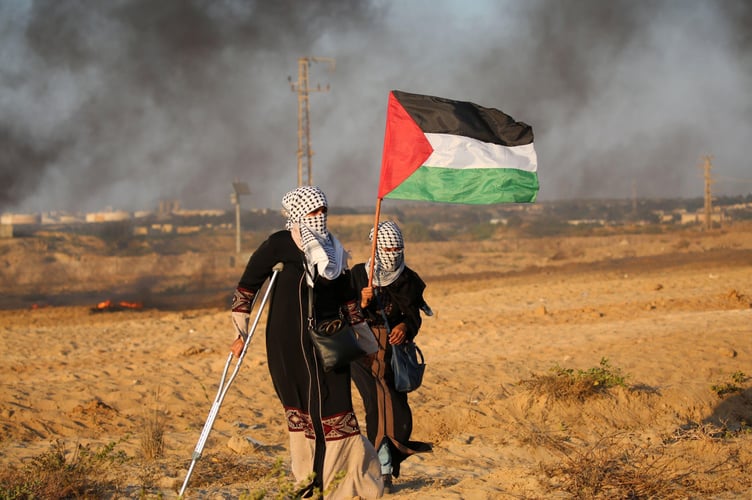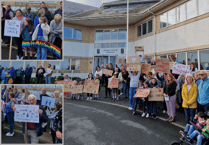SOMETIMES it’s enough to keep things very simple.
If dangerous insurgents were said to be concealing themselves in a hospital or school or refugee haven in a Western city, would it be thought reasonable and acceptable to launch a lethal military assault on the place in question when it was known to be packed with ordinary people who had nothing to do with any insurgency?
The answer is that never in a month of Sundays would such an attack be contemplated. The certainty that innocent civilians - children, women, men - would be killed or horribly injured would of course rule it out.
Yet in Gaza such assaults and deaths and injuries in just such circumstances are commonplace.
A foul assumption that some lives are worth more than others comes into view.
In June, an Israeli air-strike on a UN school in Gaza packed with displaced Palestinians reportedly killed at least 35 people. Journalists told the BBC a warplane fired missiles at classrooms on the top floor of the school in an urban refugee camp. Israel’s military said it had “conducted a precise strike on a Hamas compound” in the school.
In July, the BBC reported that at least 22 Palestinians were killed and 100 wounded in a strike on a UN-run school in central Gaza being used as a shelter by displaced people. Israel said it had targeted Hamas “terrorists” operating from the school.
Earlier in the month, at least 29 Palestinians were killed and dozens wounded in an Israeli air strike on a tent camp for displaced people in southern Gaza. An eyewitness described the number of casualties as “unimaginable”. Israeli military said it had used “precise munition” to target a “terrorist from Hamas's military wing” who had taken part in the 7 October attack on Israel.
A military assault against small numbers of an enemy said to be hiding in buildings crowded with ordinary people would never be considered in London, Paris or New York. Because you simply don’t embark on the slaughter of Londoners, Parisians or New Yorkers in order to root out a handful of insurgents.
After all, Londoners and the others are upright citizens. People who have a right to go about their day-to-day lives without fear of sudden injury or death from a full-scale military operation directed against a few individuals in their midst.
Westerners have a certain status, and get the respect and protection that goes with that. They are first-class citizens.
Palestinians in Gaza, on the other hand, are clearly not seen as first-class citizens by the Israeli government or military. And the West is not, as it should be, raging against the discrepancy.
Governments internationally need to decry the shrieking contrast between rights accorded to citizens in the West and citizens in Gaza.
They need to face up to the fact of an institutionalised, though unexpressed, acceptance of a two-tier hierarchy in human rights. What is inflicted on people in Gaza would never be inflicted on people in the West.
Governments duly condemn the horrors of Gaza. They may refer to the terrorising of its population, to the mounting threat of disease, to the relentless flattening of towns and cities, to the destruction of infrastructures.
What is not being brought out into the open is that Gaza exposes a view of humanity, in the West and in Israel, in which entire civilian populations are apparently seen as less important, and less deserving of protection, than others.
This way of viewing people may be embedded in consciousnesses to an extent that awareness may be virtually completely blotted out.
Yet the facts are not hidden, they are there to be seen. We can scarcely say they passed us by. Leaving them unchallenged becomes unacceptable. Whereas challenging them could, just, save lives.
The desecration of our countryside and Bute Energy
YOU WONDER whether Bute Energy realises how silly it sounds as it churns out its futile attempts to justify desecration of the countryside near Staylittle in Powys.
It talks complete tripe as it pushes the plan to erect 26 of the tallest wind-turbines available near the sublimely beautiful Glaslyn Nature Reserve and Pumlumon Site of Special Scientific Interest.
It says: “We hope local groups reach out, give us their thoughts and work with us to deliver a cleaner, greener future for Wales.”
This proposal would not make Wales cleaner and greener. It would simply make rather a lot of money for Bute. Adding to the billions in profits being generated by the country’s 40-plus existing windfarms, most of which is salted away by multinational owners.
Wales is already a net exporter of electricity, using only about half the amount it generates, with 40 per cent going to England. If currently proposed new windfarms - including Bute’s at Staylittle - go ahead, optimum wind capacity alone will be more than three times Wales’s own energy requirements.
Loads of people are appalled by the Staylittle plan, which would industrialise vast tracts of near-wilderness south-east of Machynlleth, north-west of Llanidloes and south of Llanbrynmair.
They recognise that, once invaded by turbines on the scale and intensity proposed, there would be no going back. This scintillating landscape would be destroyed.
Bute thinks it can bluster, perhaps charm, its way to getting what it wants, which is to profit from a project only it will ever be enthused by.
It cannot fail to feel the rage of the resistance, of the implacable opposition to ruination of a rare, uncluttered landscape. It knows all about the threat to birds from turbine blades and wires, about the gross disturbance to wildlife during and after construction, about the loss of the coveted Dark Sky status of this part of Wales.
Given such soundly-based warnings, Bute merely insults the intelligence of those working to thwart the devastation.




Comments
This article has no comments yet. Be the first to leave a comment.